We had a blast discussing the rise of the AI engineer with
host @swyx.We talked about what an AI Engineer looks like, code-centric versus LLM-centric approaches in AI development, RAG versus long context, and much more.
Watch the full conversation on our YouTube (please support us by subscribing if you can!). You can also listen on Apple Podcasts and Spotify.
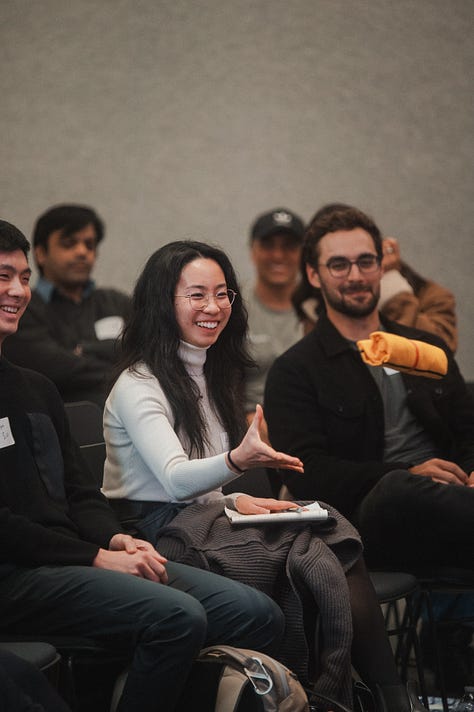

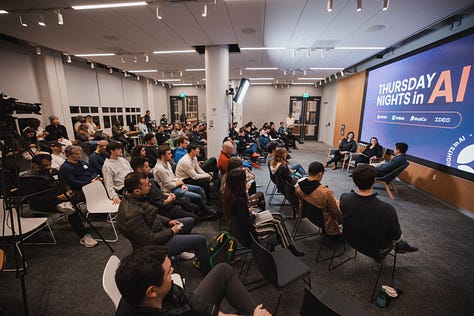
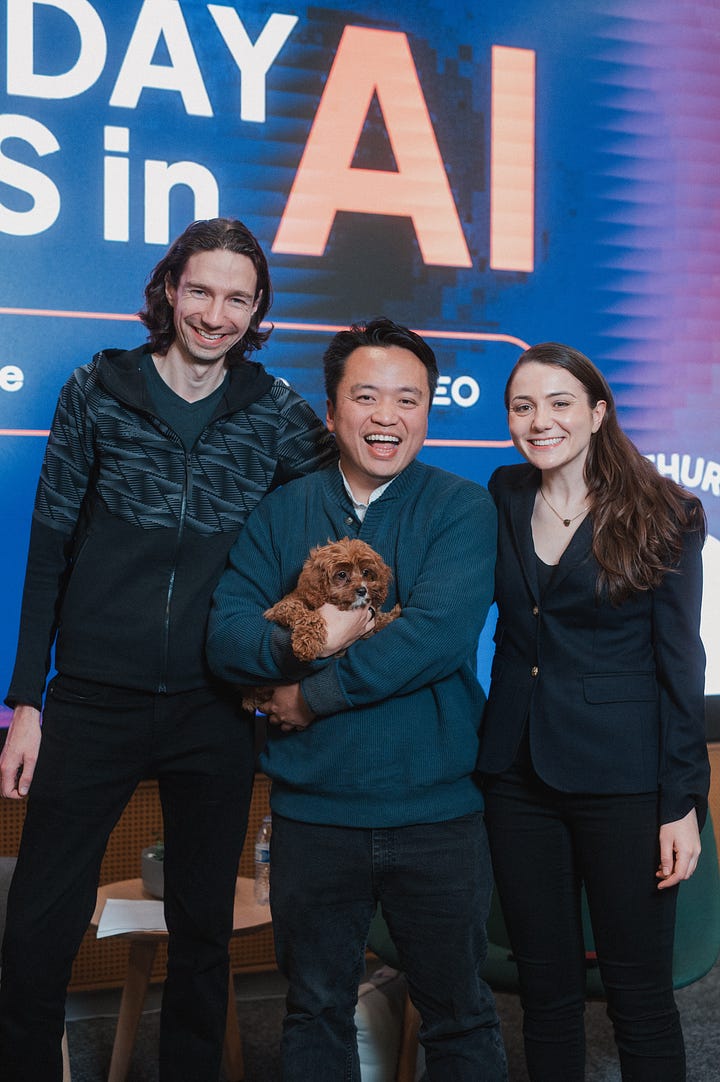
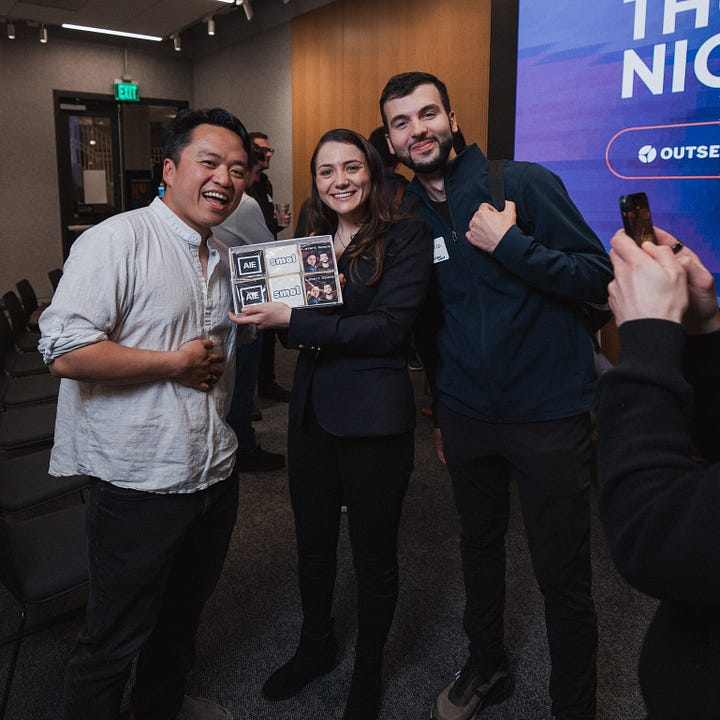
Key Takeaways
On the Rise of the AI Engineer:
"AI engineers are the architects of a new era, blending software engineering with the power of AI. We're witnessing the rise of a specialized cohort dedicated to crafting AI-centric solutions, driving innovation in AI-specific software. This evolution in job titles signifies an industry in its nascent stage, poised for exponential growth."
On Code-Core vs. LLM Core:
"Effectively, everyone has this concept of the LLM as the central processing unit, central brain in their app. But the job of an AI engineer is to recognize the limitations of relying solely on LLMs and to strategically integrate a code-centric approach to imbue intelligence to their systems, and fully harness their app’s capabilities."
On Long Context vs. RAG:
"Contrary to belief, million-context models will not kill Retrieval Augmented Generation (RAG). Right now, million-context models are not practical due to speed and cost reasons, thus we still need RAG. It's a step forward in one dimension, but improvement requires advancements in multiple dimensions, ensuring the symbiosis of different AI techniques."
On the AI Engineer's World's Fair:
"The AI Engineer's World's Fair will be like the NeurIPS for AI engineers. We aim to provide a platform for AI engineers to showcase their tools, techniques, and challenges, reflecting the state of AI engineering in 2024. It fosters collaboration, innovation, and community building within the AI engineering industry."
Transcript:
This transcript was edited for brevity.
Q: Who are you, and how did you get here?
swyx: I'm Shawn I'm from Singapore swyx is my initials. For those who don't know, many Singaporeans are ethnically Chinese and we have Chinese names and English names. I came to the US for college, and have been here for about 15 years. Half of that was in finance and then the other half was in tech.
Tech is where I was most known because I was more aligned toward learning in public. In finance, everything's a trade secret; everything is zero-sum. In tech, you're allowed to come to meetups and conferences, share your learnings, and share your mistakes … If you like to open source your code, it's totally fine, and even better, you can contribute PRs to other people's code.
I was an early hire at Netlify, AWS, Temporal, and Airbyte. I started being interested in AI, particularly stable diffusion, mostly because of starting Latent Space. I was like, okay, this is something qualitatively very different.
Latent Space wasn't a podcast for like four months. I think it was the start of 2023 when Alesio and I were both like, I think we need to get more tokens out of people, and I was running out of original sources to write about, so I was like, okay, I'll go get those original sources. I think that's when we started the podcast. I think it's just the chemistry between us, the way we spike each other in different ways, and also the kind participation of the guests to give us their time. Shout out to Alesio for booking some of our biggest guests and working really hard to try to tell the story that people can use at work.
I think that there are a lot of AI podcasts out there and a lot of AI forums, fireside chats with no fire, that always talk about, what's your AGI timeline, what's your P(Doom). Those are very nice hallway conversations for freshman year but not very useful for work. Obviously, you care about the existential safety of the human race, but in the meantime, we got to eat, so I think that's kind of Latent space's niche. We explicitly don't talk about AGI, we explicitly don't talk about things that we're like a little bit too far out, we don't do a ton of Robotics, we don't do a ton of high-frequency trading… There's tons of machine learning in there, but we just don't do that because we want to focus on what most software engineers are going to need because that's the audience that we serve. I think that has resonated with people. You would never expect a technical podcast to reach the top 10 on the tech charts. I've been surprised by that before that it's been successful.
Honestly, I kind of have this negative reaction towards being classified as a podcast because a podcast is a downstream of ideas. It's one mode of idea delivery, but you can deliver ideas on a newsletter, in person, there's so many different ways and and so I think about it more as we are trying to start or serve an industry, and that is the AI engineer industry.
Q: What is the AI Engineer?
Ali: Let's discuss that. You wrote a piece called “The Rise of the AI Engineer.” You tweeted about it, and Andrej Karpathy also responded, largely agreeing with what you said. So, what is an AI engineer?
swyx: The AI engineer is the software engineer building with AI, enhanced by AI, and eventually it will be non-human engineers writing code for you, which I know Imbue is all about. There are three types of AI Engineer. First is the Enhanced AI engineer where you use AI products like Co-pilot and Cursor. Second, the AI Products Engineer, where you use or expose AI capabilities to the end user, like not doing pre-training, not being an ML researcher, not being an ML engineer, but just interacting with Foundation models and probably APIs from foundation model labs. The third one is the non-human AI engineer the the fully autonomous dream coder.
Q: How long will it take to build the non-human AI Engineer?
Josh: How long do you think it will be before we get to [the fully autonomous dream coder]?
swyx: I have supported companies actively working on that. I think it's more useful to think about levels of autonomy. The closest comparison we have to that is self-driving. We're doing this in San Francisco. I remember we covered a little bit of Autos in my hedge fund and I remember telling a friend self-driving cars around the corner, like you know, parking will be a thing of the past, and it didn't happen for the next 10 years. But now, most of us in San Francisco can take it for granted. I think you just have to be mindful that the rough edges take a long time, and yes, it's going to work in demos, then it's going to work a little bit further.
The more useful mental model I have is levels of autonomy. So, in self-driving, you have levels in the amount of human attention you need. At first, your hands are always on ten and two, and you have to pay attention to driving every 30 seconds, and eventually, you can sleep in the car, so there's a whole spectrum of that. So what's the equivalent for that in coding? I guess it’s keep your hands on the keyboard, and then eventually, you tab to accept everything…that's the dream that people want because really you unlock a lot of coding when people non-technical people can file issues, and then the AI engineer can automatically write code, pass your tests, and if it works as advertised then you can merge it and then you know 10x 100x the number of developers at your company immediately. So that's the goal, that's the holy grail but we're not there yet. Sweep, CodeGen, Magic, and many companies are all working towards that.
Alesio and I covered in our January recap that the basic split that people should have in their minds is the Inner Loop versus the Outer loop for the developer. The Inner Loop is everything that happens in your ID between git commits, and the Outer Loop is when you push up your git commit to GitHub, for example, or GitLab, and that's a nice split. Everything local, everything that needs to be fast, everything that's very hands-on for developers, it's probably easier to automate or easier to have code assistance. That's what co-pilot is that's what that's all those things are and then everything that happens autonomously when you're effectively away from the keyboard with a GitHub issue or something that is more Outer Loop where you're relying on a lot more on autonomy and maybe our LLMs are maybe not smart enough to do that yet.
Q: Do you have any thoughts on user experience and how that will change?
Josh: Do you have any thoughts on user experience and how that will change? One of the things that have happened for us, looking at some of these products and playing around with things ourselves, like, it sounds good to have an automated PR, then you get an automated PR, and I really don't want to review like 300 lines of generated code and find the bug in it, and then you tell it like oh go fix it, and it comes back with 400 lines …
swyx: There is a length bias to code right? You do have higher passing rates in PRs. This is a documented human behavior. Send me two lines of code I will review the shit out of that. I don't know if I can swear on this … send me 200 lines of code looks good to me. Guess what, the agents will be perfectly happy to copy that behavior from us when we actually want them to do the opposite.
I think the GAN model of code generation is probably not going to work super well. I do think we probably need just better planning from the start. I'm just repeating the Imbue thesis by the way, listen to Kanjun and talk about this she's much better at it than I am…I think the code review thing is going to be a challenge. I think Codeium already thought this all the way through. They're like, okay, you write the user story, and from that, you generate all the tests, generate the code, and when you update any one of those, they all have to update together. The critical factor is the test generation from the story because everything else can just kind of bounce the heads off of those things until they pass, so you have to write good tests. It's kind of like the eat-your-vegetables of coding, which nobody really wants to do. I think it's a really smart tactic to go to market by saying we automatically generate the test for you, and you know, start not great but then get better, and eventually, you get to the weakest point in the chain for the entire Loop of code generation.
Josh: Are there some promising avenues you see forward for making that actually better?
swyx: Good isolation and proper serverless cloud environments are integral to that. It could be a fly.io, or it could be a Cloudflare worker. It depends on how many resources your test environment needs effectively. I talked about this with Rob earlier in the audience, where every agent needs a sandbox. If you're a code agent, you need a coding sandbox. Imbue used to have this sort of Minecraft ‘clone’ that was much faster.
If you have a model of the real world, you have to go generate some plan, some code, or some whatever, test it against the real world so that you can get this iterative feedback and then get a final result that is somewhat validated against the real world so like you need a really good sandbox. I think this is an infrastructure need that humans have had for a long time, we've never solved it for ourselves, and now we have to solve it for about a thousand times larger quantity of agents, so I think we actually have to evolve a lot more infrastructure to serve these things
For those who don't know, talking about the rise of AI engineers, I also have previous conversations about immutable infrastructure, cloud environments, and that kind of stuff. To solve agents and coding agents, we will have to solve the other stuff along the way. It's really neat for me to see all that tied together in my devtools work that all these themes kind of reemerge naturally because everything we needed for humans, we need 100 times more for agents.
Q: How has the term "AI engineer" evolved into not just a job title but also a term and now a conference?
Ali: AI Engineer has become a whole thing—a term, a conference, and a job title. Tell us more about what's going on there.
swyx: That is a very big cloud of things. I think it's an emerging industry. The general term is software engineer or programmer. In the 70s and the 80s, they would not be like senior engineer. They would just be engineers. t I don't think they even call engineer they don't have that.
Ali: What about Member of technical staff?
swyx: Oh yeah, MTS very very elite… but yeah, these striations appear when the population grows and the technical depth grows over time. When it starts, it's not that important, and then over time, it's just going to specialize. I've seen this happen for front end, DevOps, and data, I can't remember what else I listed in that piece, but those are the main three that I was around for. I saw this happening for the AI engineer. A lot of people argue that there is the ML researcher, the ML engineer who sort of pairs with a researcher, who they sometimes call a research engineer. On the other side of the fence is just software engineers, and that's how it was up till about last year. Now there's this specializing and rising class of people building AI-specific software that are not any of those previous titles I just mentioned, and that's the thesis of the AI engineer.
[The AI Engineer] is an emerging category of startups, of jobs. People from Meta, IBM, Microsoft, and OpenAI tell me that their title is now AI engineer or maybe hiring AI Engineers. I can see this as a trend, and I think that's what Andrej called out in his post, that mathematically, the limitations in terms of talents, research talents, and GPUs that all these will tend to concentrate in a few labs and everyone else is just going to have to rely on them or build differentiation of products in other ways and those will be AI Engineers. So mathematically, there will be more AI Engineers than ML Engineers. Right now, it's the other way around, the number of AI engineers is like 10x less. I think that the ratio will invert, and I think the goal of Latent Space and the goal of the AI Engineer conference and anything else I do is to serve that growing audience.
Q: How do you differentiate the AI Engineer from the software engineer?
Ali: To make the distinction clear, if I'm a software engineer and want to become an AI engineer, what do I have to learn? What additional capabilities does that type of engineer have?
swyx: I always think about these in terms of Baldur’s Gate, and you know, D&D rule set number 5.1…so I intentionally left that open to leave space for others. I think when you start an industry, the specifications that work the best in industries are minimally defined so that other people can fill in the blanks and I want people to fill in the blanks I want people to disagree with me and with themselves um so that we can figure this out as a group. I don't want to overspecify everything; that’s a guarantee that it will fail.
I do have a take, obviously, because a lot of people ask me like, “Where do I start?”. So we started Latent Space University, and we just finished working on Day 7 today. It's a 7-day email course designed to answer the question of like “Okay, I'm a software engineer, and I know how to code, but I don't get all this AI stuff. I've been living under a rock, or it's too overwhelming. Curate for me as a trusted friend. I have one hour a day for seven days what should I study?”. So basically there are seven projects you should do to get the basic skills that I think everyone in this industry should be conversant in. I want people who take this course to move from unknown unknowns to at least known unknowns. I think that's that's where you start being competent as an AI engineer. So yeah that's LSU Latent Space University just to trigger the tigers.
Q: Do you foresee a future where being an AI engineer becomes a dedicated full-time job, or do you anticipate a scenario where individuals, such as software engineers, integrate AI-related tasks into their roles alongside other responsibilities?
Ali: Do you think that an AI engineer will be someone's full-time job in the future? Or do you think it's going to be more of a world where I'm a software engineer and, like, 20% of my time, I'm using OpenAI APIs, I'm working on prompt engineering, using Code Pilot, and stuff like that…
swyx: I think it will be a spectrum. That's why I don't want to be too definitive about it. We’ll have full-time front end engineers, part-time front-end engineers and you dip into that community whenever you want but wouldn't it be nice if there was a collective name for that community so you could go find it, you can find each other? A lot of companies were paying me to help them hire this kind of person, and then people on the labor side were pinging me going “I want to do more in this space but where do I go?” and I think just having that shelling point of industry title and name is and then sort of building out that mythology and community and conference I think is helpful hopefully.
I don't have many prescriptions on whether or not it's a full-time job. I do think that over time, it's going to become more of a full-time job, and that's great for the people who want to do that and the companies that want to employ people who can take it part-time. Jobs come in many formats.
Q: Can you tell me more about the AI Engineer World’s Fair?
Ali: You have a huge World Fair coming up. Tell me about that.
swyx: Part of I think what creating an industry requires is to let people gather in one place and also for me to get high-quality talks out of people, you have to create an event out of it, otherwise they don't do the work.
Last year, we did the AI Engineer Summit, which went very well. People can see that online, and we're very happy with how that turned out. This year, we want to go four times bigger with the World’s Fair and try to reflect AI engineering as it is in 2024. I always admired two conferences in this respect; one is NeurIPS, which I went to last year and documented on the Latent Space podcast. Second is KubeCon from the other side of my life: cloud orchestration. I thinkNeurIPS is the top conference because its where the research scientists, researchers, and PhDs are the stars. Mostly it's just PhDs on the job market, to be honest.
For the World’s Fair, I wanted AI Engineers to be the stars, to show off their tooling and their techniques, and their difficulty moving all these ideas from research into production. The other one was Kubecon, where you could honestly not attend any of the talks and just walk the floor and figure out what's going on in DevOps, which is fantastic. So yeah, that curation and that bringing together of an industry is what I'm going for in this conference, and yeah, it's coming in June.
The most important thing to me, to be honest, when I conceived this whole thing was to buy the domain. So I got AI.engineer. People are like, “Engineer is a domain?” and funny enough, dot engineer was cheaper than dot engineering. I don't understand why but like that's up to the domain people.
Q: Do your podcast discussions give you insight into technical issues like testing for coding agents, and do you think retrieval will still matter with models handling millions of tokens?
Josh: You have much exposure talking to all these companies, founders, researchers, and everyone that's on your podcast. Do you feel like you have a good perspective on some of the things, that like some of the kind of technical issues having seen, like what we were just talking about for coding agents, how the value of testing is really important…are other things for retrieval like now we have these models coming out with a million tokens of context or 10 million…is retrieval going to matter anymore?
swyx: Specifically about the long context thing?
Josh: sure yeah.
swyx: For those who don't know, long context was kind of in the air last year but really really really came into Focus this year with Gemini 1.5 having a million token contexts and saying that it was in research for 10 million tokens. That means that you no longer have to really think about what you have to put into context; you can just kind of throw the entire knowledge base in there, or books, or film, anything like that. and that's fantastic. A lot of people are thinking that it kills RAG, and I think that's not true first because of any kind of cost reason. You still pay per token, so basically, Google's perfectly happy to let you pay a million tokens every single time you make an API call, but good luck having a $100 API call. The other thing is it's going to be slow, no explanation needed, and then finally, my criticism of long context is that it's also not debuggable. If something goes wrong with the result you can't do like the Ragas decomposition of the source of error. You just have to go like it's the way, bro, like it's somewhere in there. People love to kill RAG, it's so much kill it though because it's too expensive...I just think I call it a different dimension I think it's an option that's great when I'm prototyping I do not ever want to worry about context, and I'm going to call stuff a few times, and I don't want to run into errors I don't want to have it set up a complex retrieval system just to prototype something but once I am done prototyping then I'll worry about all the other RAG stuff, and yes I'm going to buy some system, build some system or whatever to to to go do that I so I think it's just like an improvement in like one dimension that you need but the improvements in the other dimensions also matter, and it's all needed. This space is just going to keep growing in an unlimited fashion I do think that this, combined with multimodality, does unlock new things.
Q: How important is multimodality?
Josh: How important is multimodality? Sure, it's great for generating videos or whatever, but how many of us need to generate videos that often? It'd be cool for TV shows, sure…
swyx: Pretty important. When we launched the Latent Space Podcast we listed a bunch of interest areas. I love being explicit or intentional about our work so we list the things we're interested in and the list of things that we’re not interested in. One of the things that we were not interested in was multimodality last year because I was like, okay, you can generate images, and they're pretty, but like not a giant business. I was wrong. Midjourney is a massive business.
Being able to to natively understand audio video, and code...I consider code a special modality because it's not qualitatively different than translating it into English, first using English as a bottleneck and then applying it in LLMS. The ability of LLM to reason across modalities gives you something more than you could individually by using text as a universal interface, so I think that's useful. What it means is that the reference post for everyone that you should have in your head is Simon Willison's post on Gemini 1.5’s video capability, where he shot a video of his bookshelf just kind of scanning through it; he was able to give back a complete JSON list of the books and the authors and all the details that were visible there. It hallucinated some of it, which is another issue, but I think it unlocks this use case that you would not even try to code without the native video understanding capability, and on a technical level, video is just a bunch of frames so actually it's just image understanding but image within the temporal dimension, which this month I think became much more of an important thing. I don't think anyone was talking about the integration of space and time in Transformers until this month, and now it's the only thing anyone can ever think about for Sora and all the other stuff.
I kind of agree with Nat Freeman who actually kind of pointed out just before the Gemini thing blew up this month. Like, why is it that OpenAI is pushing DALL-E so hard? Why is Bing pushing Bing Image Creator? It's not apparent that you have to create images to create AGI but every lab just seems to want to do this. I kind of agree that it's not on the critical path especially image generation, maybe image understanding, video understanding, consumption but mot generation. Maybe we'll be wrong next year and catch a bunch of flack with like you know culture war things.
Rapid Fire Questions
Ali: So we're going to ask you some rapid-fire questions so please respond as quickly as possible.
If someone had to listen to Just one episode of Latent Space which one should they listen to?
swyx: God…. The Four Wars episode that we did last year, it was the recap of 2023.
How much time do you spend on Twitter every day?
swyx: If I’m being honest with myself like three and a half hours. I use it to write, research, and DM…what would be really interesting is to know the split between like time on feed versus time on search bar versus time on DMs
Favorite model to use?
swyx: Mistral. I've been spending a whole bunch of time on Mistral’s stuff. They have done incredible amounts of work. I don't know what they've done, but uh this is currently the undisputed open source model. Its beating Gemma from Google. What is so good about it is it not just does well on benchmarks but also like it's very fine tunable and that is catnip for anyone working on open source and anyone who's “GPU poor” that has some extra data or a specific use case which is for me, extractive summarization.
Favorite AI tool?
swyx: I have made my own so I'll plug that one later, but I'll mention Cursor first. Cursor was a previous guest on Latent Space and was also used by OpenAI to code. It's basically just a better co-pilot. Like a fork of vs code that was like slightly better AI Integrations. They're trying to build out differentiation over time, but it is magical when you are tired and you want to make a change onto your code and you're like uh this will take me like 30 minutes to figure out. With cursor, you just type in a prompt and it just modifies the code for you in the way that you wanted. There's nothing better in the world than that.
I also created my own which is GodMode. It is a chat browser. I use it to simultaneously run all the chats and it's a really quick way to test the Vibes, or see like the differences between the outputs of different models all at the same time
Who do you think will have a bigger impact on AI in the long run, Mark Zuckerberg or Sam Altman?
swyx: oh my god interesting this is open source versus closed-source right. I think its got be Sam Sam.
If you had to work for one of them which would you rather work for?
swyx: for boy these are tough questions… I guess Sam. I am very OoenAI centric. I've come out as a pragmatic show for OpenAI.
What do you uexpect to see from OpenAI this year?
swyx: GPT5. Forr those of you who don't know like Sam said that they were actively working on shipping this, so I think this summer is going to be showdown between LLaMA 3 and GPT5 and probably GPT 5 will win.
On a scale of 1 to 10, how similar is your life here to the show Silicon Valley?
swyx: Kind of like a 5 out of 10. I'm just thinking of like the fundraising they did where they
were going around being extremely mean to VCS. Yeah I never got there, maybe I should but that would have been hilarious
Ali: For what it's worth, we did a panel with Harrison from Langchain, Anton from Chroma, and Brian from unstructured, Anton said 10/10 and Harrison said like seven or eight
swyx: Yeah I think Anton lives very hard so like I could absolutely see him being the guy with like an island.
What's one weird or unexpected use of AI you've come across recently?
swyx: This story still sticks in my head, I don't know how much actual AI was in there but it was AI for dating, like swiping through the dating apps and generating messages to talk with a whole bunch of folks and you know narrow down the funnel and I'm just like you know if they're happy and they did get married so happy ending in the end. There's some ethical issues there it's kind of vague but still like it's a system that's extremely stacked against guys and if this nerdy programmer figured it out then he's my hero.
Favorite follow on Twitter?
swyx: Right now I guess, main_horse. I have a list, for those who are keeping track of how I consume my info; it's called “AI High signal”. It's about 360 people that I follow. I now scrape all AI twitters and all AI discords into a single summarization that's the only way to keep up.But you know Andrej once said that the best way to keep up is Hacker News, yourlocal_llama, and anonymous anime profile pics on Twitter. The leading Anonymous anime profile pick is main_horse I don't know where he works but he definitely works at a large model lab and he or she is very insightful.
Is SF back?
swyx: never left never left
How many more years do you plan to live in SF?
swyx: Two to three years for personal reasons because my family's back in Singapore but I will always be spiritually here.
One founder or leader that you really admire?
swyx: That is not Sam Altman. That is not Sam Altman. Can I call out a friend? He for runs Indent go check out Indent.ai. I’m just thinking like he's a wholesome guy who cooks extremely extremely well um and makes my life so much better for knowing him.
Q: Do we need another Foundation model company, and if so, why?
swyx: Yes. Competition is great. It keeps the other leaders on their toes. Honestly, it's more like we do need it. We just can't afford it because if Google tries very hard and comes in number two to OpenAI, then what hope do the rest of us have? I think with Gemini, Google has created sufficient differentiation for itself, which is fantastic. We need just more options out there, so yeah, absolutely, there should be more Foundation model companies. You can spike different areas as well. You can have Finance Foundation model companies; those are legit. I don't think that single-minded pursuit of AGI should be the goal of everyone I think some people should work on it but the rest of us like there's much much good in the world to be done from very focused Foundation models that solve meaningful economic problems in the world um perhaps like Imbue.
Ali: What about Anthropic are you bullish on Anthropic?
swyx: Yes, because of the concentration of talent. But Claude has not spiked in a meaningful way since the initial 100K context thing that they differentiated on. I think having a really deep focus on interpretability and alignment may pay off in the long run. Just get the smartest people, get the time and space away from the hype because there's just never enough hype, and really introspect on how models work and how to turn on and off behaviors in models. The fact that they have funding and are carving out a space for the top minds in that field to go there and do that work is very important and might pay off eventually. They're very important in the overall ecosystem.
Q: What is your take on Apple? Where do you think they are in terms of AI?
swyx: Apple's waking up. They're building, they mentioned AI for the first time in a long time. They were actually at NeurIPS. I tried to interview them and and they called up to the marketing department the marketing department and said no. Otherwise, I would have gotten an Apple interview, which is impossible. If there were a local or personal AI champion that doesn't call out to a god machine that just runs and works for you, it would be Apple if Siri wasn't so horrible. I think they're well aware of that, and you know they're making us wait extremely long for better Siri.
Q: What application categories should we focus on as AI Developers and designers? What do you see as holes or missing opportunities where you think people should be focused on the intersection of design and intelligence?
swyx: I think new form factors are very helpful. Everyone loves to hate chatbots. They're like, look beyond the chat box, and I'm like, okay, but everyone's still using ChatGPT. I think new form factors are key. I think IDEO is key. So rabbit was like the winner of CES and I hope everyone has seen rabbit, it is basically a dumb phone with with AI on it. We need new things like not everything should look like an iPhone.
It interests me, and I think right now, how we design web interfaces is like an application here, then the chat box here at the small little side of things, and what structured UI output and generative code UI enables is an inversion of that; where the chatbot is the main experience, but it generates interfaces as required. If the interface that the programmer anticipated isn't quite what I want, I can just make new ones for me, and it just sticks around, and it's my interface with your application. I've been frustrated so many times like the workflow that I wanted just broke because like some designer somewhere didn't like what I did or something. I was in the 49% bucket that didn't do an AB test well. Generative UI means personal UI for everyone, and I think that we are in a position to enable that for everyone, which is really great.






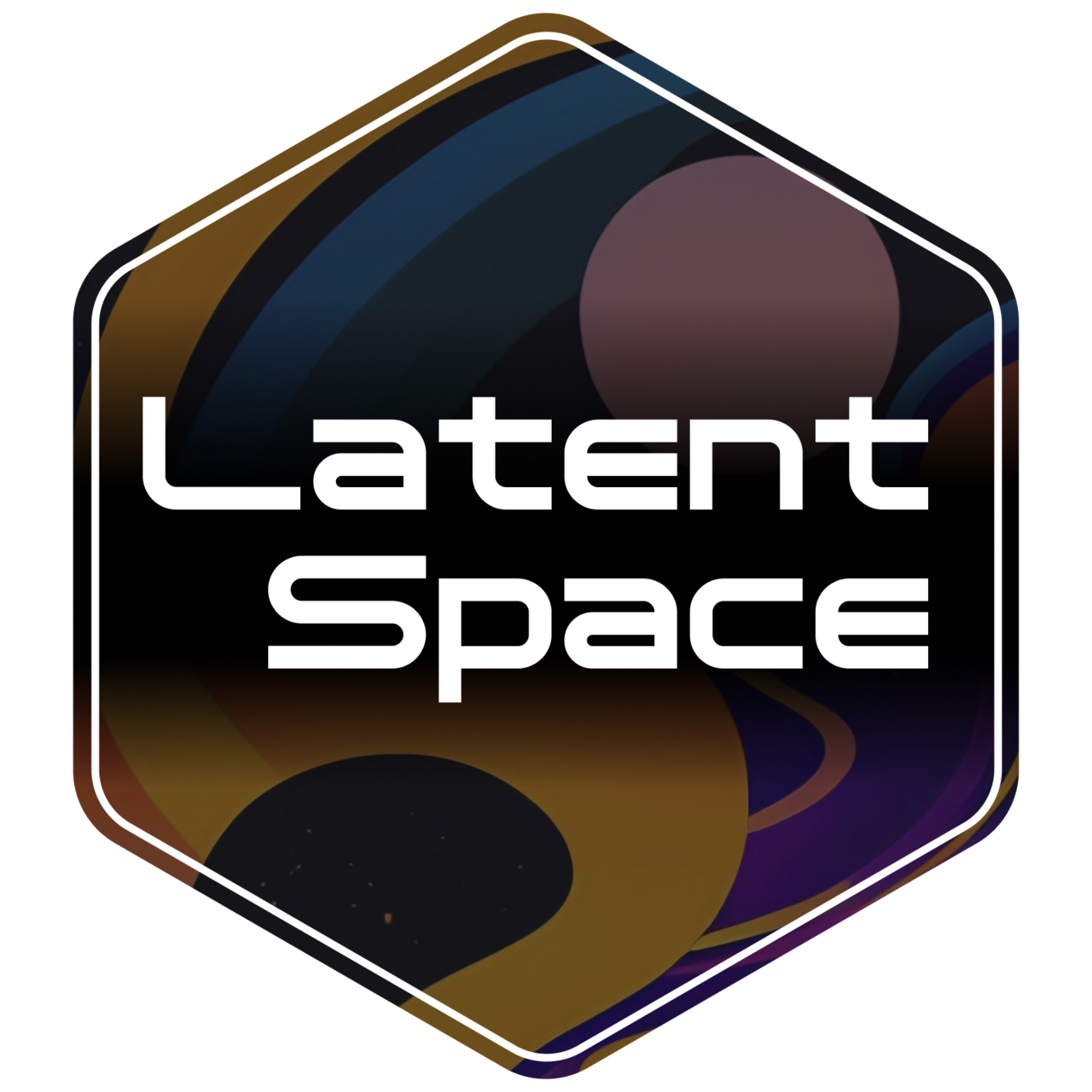




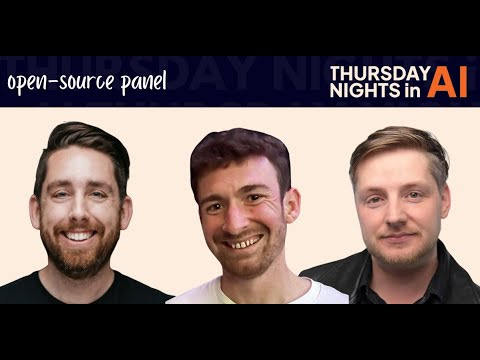

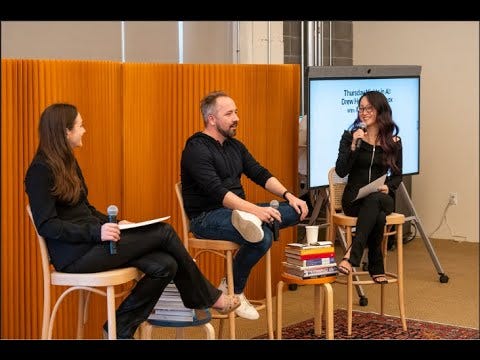

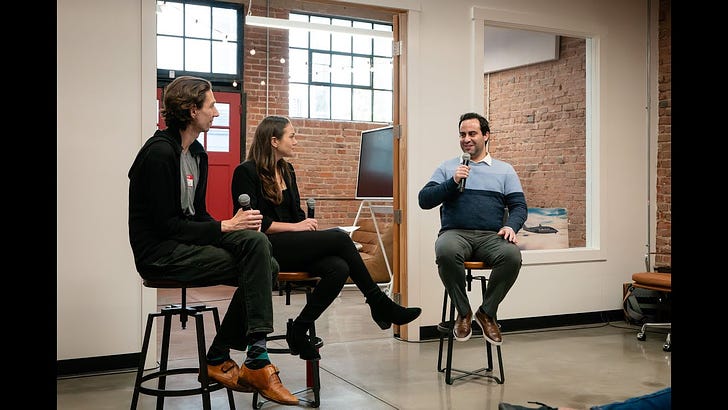
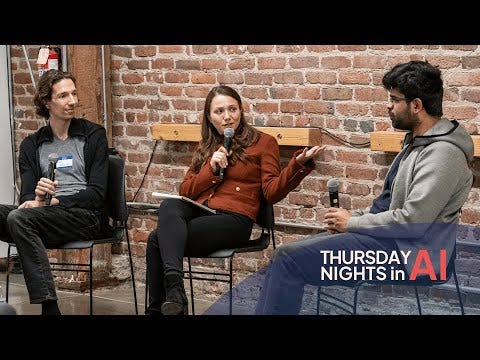
Clips + recording: The Rise of the AI Engineer with @swyx